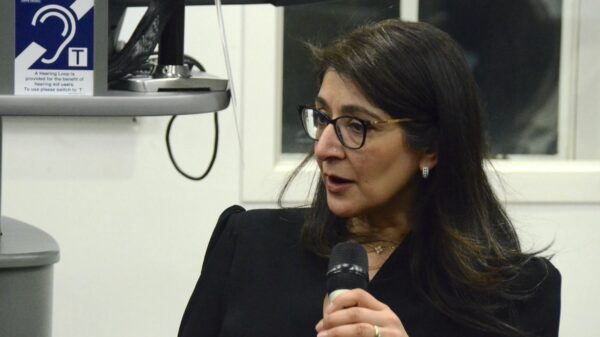Roar writer Danielle Jones on how the murder of Sarah Everard has uncovered widespread abuse of power, incompetence and toxic culture within Britain’s police forces
Since police officer Wayne Couzens was sentenced to life in prison for the murder of Sarah Everard, the Metropolitan Police and law enforcement across the UK have sparked outrage with their “advice” for women dealing with male officers in the future.
Sarah Everard was stopped while walking home from a friend’s house by an off-duty Wayne Couzens on March 3rd this year. Everard was falsely stopped under the pretence of breaching Covid-19 restrictions in place at the time. Couzens then abducted her, before raping and murdering her, and then dismembering and disposing of her body.
While Couzens was off-duty at the time, he used his power as a serving police officer to stop Everard. Some questioned why Everard got into an off-duty officer’s car, but this was met with many women flooding social media stating they would have got into Couzen’s car as well. One Twitter user stated “If a police officer waves his warrant card at you, why wouldn’t you? Why would you have questioned it?”.
While Everard’s murder already shattered the public’s trust in the police, what disturbed many women even more was the response from police forces across the United Kingdom after Couzens’ arrest. One might think the Commissioner of the Metropolitan Police, the force Couzens was serving with at the time her murdered Sarah Everard, would be humbled by the experience and promise a complete overhaul of the culture that allowed Couzens to serve as a police officer for more than fifteen years. However, that was not the case.
In the wake of Couzens’ sentencing, Commissioner Cressida Dick and other high-ranking members of the Metropolitan Police made several controversial public statements and “suggestions” to help keep women safe from attacks.
A “Walk Me Home” service, which would be operated through the emergency number “888”, has been proposed. It would allow people in vulnerable situations, such as walking alone at night, to have their journey tracked and trigger an alarm if they do not arrive at their destination by a certain time. However, some have pointed out that this idea yet again places the onus on potential victims to keep themselves safe, rather than the police to stop such attacks. Furthermore, several experts have criticised the scheme. Jamie Kingler, co-founder of the collective “Reclaim These Streets”, said in an interview with Radio Times “women already text their friends to say that they have arrived home safely…[and] police in the UK have a track record for not believing reports of missing women in any case.”
When details of Couzens’ pre-meditated attack came to light, including the fact he used his police-issued warrant card and handcuffs to falsely arrest Ms Everard, the Metropolitan Police issued this advice to women: “If…you feel in real and imminent danger and you do not believe the officer is who they say they are…you must seek assistance – shouting out to a passer-by, running into a house, knocking on a door, waving a bus down or, if you are in the position to do so, calling 999.” The force came under fire, with many arguing that civilians should not be responsible for ensuring each others’ safety. Others pointed out that buses in areas outside of London and large cities are infrequent and that bus drivers are trained to not stop anywhere except for designated stops.
It also begs the question of why Cressida Dick felt it appropriate to advise women to call “999” to verify officers’ identities when Couzens was a serving police officer. Had Sarah Everard called “999”, the call operator would more than likely had confirmed Couzens’ legitimacy as an officer and Everard would still have gone with her killer.
North Yorkshire Police, Fire and Crime Commissioner Philip Allott resigned after his comments sparked a no-confidence vote. Allott urged women to be “streetwise” and educate themselves about police powers so that they are aware of “when they can be arrested and when they can’t be arrested” in a radio interview aired on BBC Radio York.
While these comments highlight a toxic culture of victim blaming within police forces across the UK, perhaps most shocking of all comes the revelation that Couzens had faced allegations of sexual assault as far back as 2015. Since 2010, 771 Metropolitan Police employees have faced sexual misconduct allegations, according to a Freedom of Information request. Over 88% of these allegations were against serving police officers but only 83 of those cases ended in the perpetrator being fired. The figures highlight dismissal of allegations at best and one of cover-ups at worst within the Metropolitan Police.
Couzens reportedly had the nickname “the rapist” and former colleagues have alleged he had a substance abuse issue, as well as multiple complaints of public indecency and sexual assault against him. Surprisingly, Couzens was a parliamentary and diplomatic protection officer at the time of Everard’s murder. Usually such officers are subjected to enhanced vetting before starting this role but Couzens slipped through the system likely because police departments acted quickly to hire new officers into the force following the 2017 Paris terror attacks. Assistant Commissioner Nick Ephgrave has admitted that a background check performed on Couzens when he joined the Metropolitan Police in 2018 was not carried out “correctly”.
The Metropolitan Police Service has so far failed to respond to Freedom of Information requests from Roar asking for statistics on the number of officers who, like Couzens, were “rushed through” the system and therefore may not have had enhanced background checks. It begs the question, how many other officers are there that may commit crimes against women or other vulnerable groups?
Just last month, serving Police officer PC Adam Zaman appeared in court facing rape charges. Also in October, a serving Sussex police officer was arrest on suspicion of rape. These cases are not isolated incidents either; more than two thousand officers have been accused of sexual misconduct in the UK in the past four years. It highlights a worrying trend of officers who have been drawn into the profession by the promise of power and who feel confident enough to abuse their powers.
A YouGov poll has revealed that a plurality of young people, 48%, said they did not feel confident in the ability of police in their local area to protect them. Most telling were the responses to questions about the Metropolitan Police Service in particular as the poll shows that trust in police in the London area is significantly lower than other parts of the UK.
Policing in the UK has always been at the consent of the general public. “Policing with consent” refers to the notion that the power of the police comes from the trust and confidence of the public. With trust in the police trending downwards, is it possible that in several years the police, as an institution, will be unrecognisable. Women and those from ethnic minority groups may hail a new era in policing if it is brought about, but for now we must wonder: who is there to protect us when those who are meant to abuse their power?
















